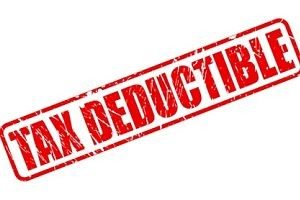It’s that time again – tax time! There are many things in life that you can’t depend on, but you can certainly depend on the fact that tax time will come around every year. The good news is that as an investment property owner there are significant tax deductible items that you can claim.
One of the most common questions on this topic is whether property management fees are tax deductible. Fortunately, they are. Whether you hire a property management company, an individual to manage your property, or even just an on-site manager, these fees are fully deductible.

Below are some more of the most common tax deductible fees that owners of investment property are able to claim;
-
Mortgage Interest/Discount Points.
=If you still hold a mortgage on the property, the interest paid could be one of your largest deductions. Also, if you paid discount points on the purchase of the property or at refinancing, these are also tax deductible. Interest paid on loans taken for repairs and/or maintenance to the property, as well as credit card interest paid for items used on the property would also be deductible.
-
Real Estate Taxes/Fees.
Real estate taxes usually show up on the form 1098 that you receive from the bank after the end of the year because they are paid through the mortgage company. Permit fees and inspection fees are deductible as well.
-
Repairs and Maintenance Costs.
Repair costs are clear, something is broken or not working properly and you pay to have it fixed. Examples of maintenance costs would be; lawn mowing, landscaping and tree trimming, pest management, light bulbs, smoke detector batteries, HVAC filters, janitorial items, etc. Cost for maintenance on equipment such as lawnmowers and leaf blowers would also fit in this category.
-
Insurance Premiums.
The following types of insurance premiums would be deductible; homeowners insurance, mortgage insurance premiums, theft insurance, worker’s compensation insurance, general liability insurance, etc.
-
Travel Expenses.
A great number of investment property owners do not live near their property. If you travel to look in on your investment property, or to do business in relation to the property, these expenses are deductible. They would include air fare, car rentals, hotels and 50% of meals while traveling long distance.
-
Professional and Legal Fees.
If you use an accountant or a tax professional, these fees are deductible. In the case of an eviction, lawyer’s fees and court costs would be deductible. You can also deduct the cost of bookkeeping or tax preparation software such as QuickBooks or Turbo Tax.
-
Depreciation.
The main costs that you can capitalize and depreciate are the value of the structure and the value of improvements such as appliances, carpet, windows, etc. The depreciation on these expenses must be spread out over several years and cannot all be taken in one single year.
While these are some of the main tax deductions available to you as an investment property owner, there may be more that your tax professional can help you find. These tax savings are yet another way that owning investment property benefits you!

.png)